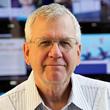A warm tone, a sense of wonder and a spirit of discovery distinguish the music of Charles Lloyd, whose artistry defies both age and category. On flute and saxophone, as a bandleader and composer, he has followed a singular path to the pinnacle of creative achievement. Never one to rest on his laurels or turn a groove into a rut, he continues to explore new vistas, making music that challenges himself and enriches his listeners. Heals them, even. And he somehow makes it all look and sound as natural as breathing.
“Every day is a fresh start,” he says. “I hike mountain trails, listen to the frogs and birds singing in the night, swim under water… When I come up for air, the sky is still there, and I know that I must go further in my search of One.”
His return to Chicago for a performance on October 25 at Symphony Center finds Lloyd in the midst of an extended resurgence. He recently swept the DownBeat annual critics poll with top artist, album and tenor saxophonist honors, in light of his recent The Sky Will Still Be There Tomorrow. Not bad for an 86-year-old musician. The double album was released in March, his 86th birthday, more than a half-century after DownBeat had first named him artist of the year.
Back then, in the mid-1960’s, he was occasionally playing the same psychedelic halls as rock bands, recording with them, and selling albums in similar numbers. By the early 1970s he had pivoted, trading self-medication for the meditation practice that would transform his life and music. He quit recording and touring as a bandleader, and went into retreat amid the natural splendor of Big Sur.
“I never thought I would return [to music] and had no plans to do so,” he says of his hiatus, which extended well into the 1980s. “Living among the redwoods at the edge of the sea in Big Sur was very healing.” He played and recorded sporadically, but it wasn’t until he was hospitalized in 1986 with what he calls “a near death experience” that he renewed his commitment to music full time.
“I realized that I am in service, and music is the vehicle of my service,” he explains. “This was a fresh start of sorts – coming out of the silence of my retreat in Big Sur for so many years. To this day, the effort continues, I am in service. The Creator has a carrot dangling in front of me and keeps saying ‘Not yet Charles.’ If I could find the note that could say it all, I would disappear back into the forest.”
This second life as a creative musician has rivaled or even eclipsed the renown he achieved in the 1960s. Every album feels like an event, every performance an epiphany. Over the course of a decade, since signing with the Blue Note label and releasing Wild Man Dance in 2015, he has recorded with the Marvels, including fellow iconoclasts Bill Frisell and Lucinda Williams, combining improvisation with roots-oriented Americana. He has also released three very different albums, packaged as Trios, with significantly different lineups and musical textures. He continues to explore the unpredictable, with change the major constant in his progression, along with the singular warmth of his tone.
His lifetime search has taken him all over the globe. Born and raised in Memphis, he began his apprenticeship within that city’s blues tradition, performing with the likes of Howlin’ Wolf and B.B. King. His musical education and wanderlust would take him to USC in Los Angeles and then to New York. It would also find him responding to inspirations across international borders and genre boundaries, anticipating what would be called “world music.” (He additionally collaborated with his fellow meditators in the Beach Boys, as well as other rock musicians.) Labels and categories seemed too reductive to capture his restless spirit.
“When you love music, you love a lot of it,” he says. “I grew up around the blues and jazz. Along the way in high school, I fell in love with Bela Bartok. When I was at USC I heard Ravi Shankar and Alla Rakha in concert – it was very soulful and spoke to me. To my ears they were playing the blues in another way.
“During the 60s in New York City, when I was not on the road touring, I played a lot with the great Nigerian percussionist, Olatunji. This was a beautiful and expanding alliance for me. As a sound seeker, I have incorporated many instruments from the Tibetan oboe, to tarogato, to cymbalom, to Greek lyra. If I had an impact on ‘world music,’ it was an organic byproduct of my own development as a music maker.”
The complementary bill at Symphony Center additionally celebrates the music of another trailblazing saxophonist. The program will also feature, “The Legacy of Wayne Shorter” performed by Danilo Pérez, John Patitucci and Brian Blade, the three remaining members of Wayne Shorter’s legendary quartet, and joined by special guest Mark Turner. They will honor Shorter’s contributions to jazz through interpretations of his compositions.
“Wayne was one of our very greatest creators – he remained dedicated and focused on his mission to the very end. It was always a great joy each time we met up,” says Lloyd. “We became friends when we were both in our early 20s and I we were both serious about our sound and our spiritual path. I think we recognized a kindred spirit in each other.”


